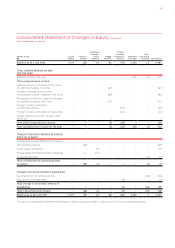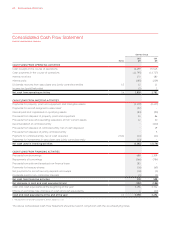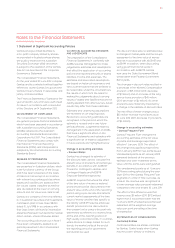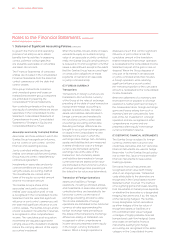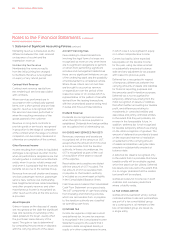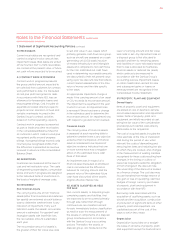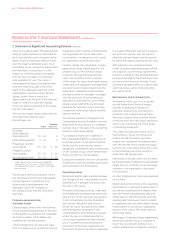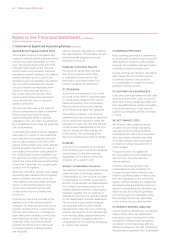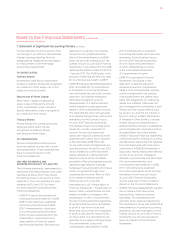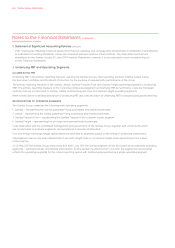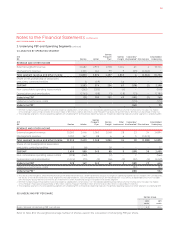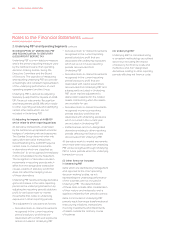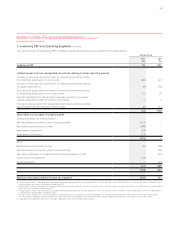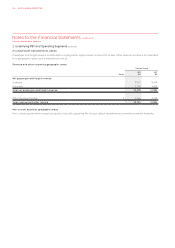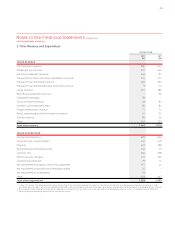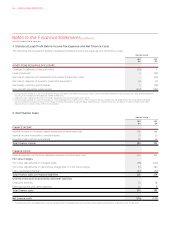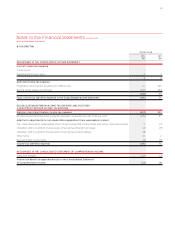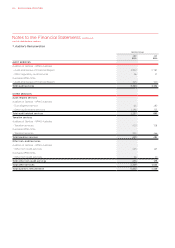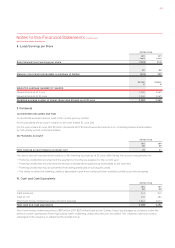Qantas 2012 Annual Report Download - page 81
Download and view the complete annual report
Please find page 81 of the 2012 Qantas annual report below. You can navigate through the pages in the report by either clicking on the pages listed below, or by using the keyword search tool below to find specific information within the annual report.
FOR THE YEAR ENDED 30 JUNE 2012
Notes to the Financial Statements continued
Income Statement over the period of the
borrowings on an effective interest basis.
Interest-bearing liabilities that are
designated as hedged items are subject
to measurement under the hedge
accounting requirements.
Y SHARE CAPITAL
Ordinary Shares
Incremental costs directly attributable
to issue of ordinary shares are recognised
as a deduction from equity, net of any
related income tax benefit.
Repurchase of Share Capital
When share capital recognised as
equity is repurchased, the amount
of the consideration paid, including
directly attributable costs, is recognised
as a deduction from equity.
Treasury Shares
Shares held by the Qantas sponsored
employee share plan trust are
recognised as treasury shares
and deducted from equity.
Z COMPARATIVES
Various comparative balances have
been reclassified to align with current
year presentation. These amendments
have no material impact on the
Financial Statements.
AA NEW STANDARDS AND
INTERPRETATIONS NOT YET ADOPTED
The following standards, amendments to
standards and interpretations have been
identified as those which may impact
the Qantas Group in the period of initial
application. They are available for early
adoption at 30 June 2012, but have
not been applied in preparing these
Financial Statements.
— AASB 9 Financial Instruments and
consequential amendments in AASB
2009-11 Amendments to Australian
Accounting Standards and AASB
2010-7 Amendments to Australian
Accounting Standards (December
2010), includes requirements for the
classification, measurement and
derecognition of financial assets
and financial liabilities. Retrospective
application is required. The Qantas
Group has not yet determined the
effect of the amendments to AASB 9,
which will become mandatory for the
Qantas Group’s 30 June 2013 Financial
Statements. In December 2011, the IASB
deferred the effective date of IFRS 9 to
1 January 2015. The AASB is also in the
process of deferring the effective date
for its endorsed equivalent, AASB 9.
— AASB 119 Employee Benefits (September
2011), and AASB 2011-10 Amendments
to Australian Accounting Standards,
have eliminated the use of the ‘corridor
approach’ and instead mandated
immediate recognition of all re-
measurements of a defined benefit
liability (asset) including gains and
losses in other comprehensive income.
The amendments, which are generally
to be applied retrospectively, will become
mandatory for the Qantas Group’s
30 June 2014 Financial Statements.
The Qantas Group’s accounting policy
utilises the ‘corridor approach’ to
account for actuarial gains and
losses with respect to defined benefit
superannuation plans. Upon adoption
of the amended AASB 119 for the
30 June 2014 Financial Statements, the
opening balance sheet (30 June 2012)
will be restated to a defined benefit
liability instead of a defined benefit
asset as a result of the immediate
recognition of the unrecognised actuarial
losses through retained earnings.
Subsequent actuarial gains and losses
will be recognised through other
comprehensive income. Refer to Note
30 for details of defined benefit
balances as at 30 June 2012.
— Amendments to IAS 1 Presentation of
Financial Statements – Presentation of
Items of Other Comprehensive Income,
makes a number of changes to the
presentation of other comprehensive
income including presenting separately
those items that would be reclassified
to profit or loss in the future and
those that would never be reclassified
to profit or loss and the impact of tax
on those items. The amendments are
generally to be applied retrospectively.
The amendments, along with
consequential amendments in AASB
2011-9 Amendments to Australian
Accounting Standards, which become
mandatory for the Qantas Group’s
30 June 2013 Financial Statements,
will only impact the presentation
of other comprehensive income
in the Consolidated Statement
of Comprehensive Income.
— AASB 10 Consolidated Financial
Statements, introduces a new
approach in determining which
investees should be consolidated.
AASB 11 Joint Arrangements, requires
a joint arrangement to be partially
consolidated when the parties have
rights and obligations for underlying
assets and liabilities. Otherwise, the
joint arrangement is considered a joint
venture and the equity method must
be used to account for the interest in
the joint venture. AASB 12 Disclosures
of Interests in Other Entities, contains
revised disclosure requirements for
entities that have interest in subsidiaries,
joint arrangements, associates and/or
unconsolidated structured entities.
AASB 127 Separate Financial Statements,
carries forward the existing accounting
and disclosure requirement for separate
financial statements with some minor
clarifications. AASB 128 Investments in
Associates, makes limited amendments
on how to account for changes in
interests in joint ventures and associates.
The above amendments, and
consequential amendments in AASB
2011-7 Amendments to Australian
Accounting Standards, which become
mandatory for the Qantas Group’s
30 June 2014 Financial Statements,
are not expected to have a material
impact on the Financial Statements.
— AASB 13 Fair Value Measurement, explains
how to measure fair value when
required to by other accounting
standards. The amendments are
generally to be applied prospectively.
This amendment, along with AASB 2011-8
Amendments to Australian Accounting
Standards, become mandatory for the
Qantas Group’s 30 June 2014 Financial
Statements, but are not expected to
have any impact on the Financial
Statements.
1. Statement of Significant Accounting Policies continued
079


